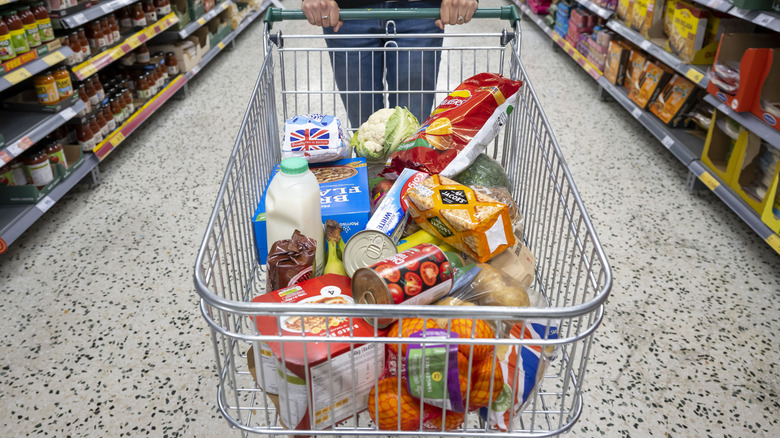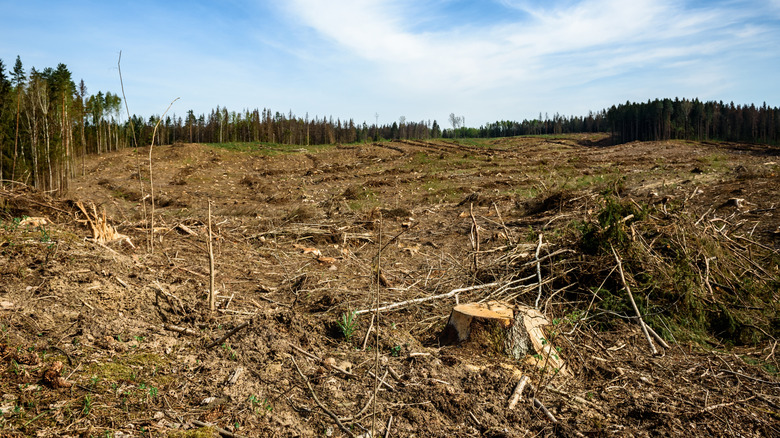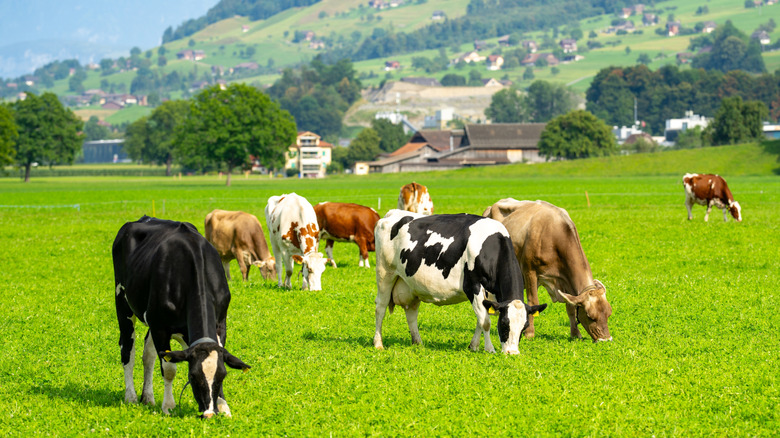The Most Inefficient Food To Produce Is Something Most People Take For Granted
Humans are omnivores, which means we can eat a wide range of foods. However, we also have pretty specific preferences, and this leads us down a very inefficient path when it comes to food production. Take the soy plant, for example. We use it for tofu, vegan milk, umami-packed miso, edamame, soy sauce, and more, but out of all the soy we produce, only around 7% of it gets turned into food products for humans to eat (per Our World in Data). The majority of soy (up to around 77%) goes toward producing the most inefficient food: beef.
To get one cow's worth of beef into our supermarkets, it has to be fed soy and other grains for around 18 months, and farmers aren't stingy with the food either. They actually overfeed the cows and minimize their movements to produce fattier, tastier beef in larger amounts. According to a 1997 study out of Cornell University, the ratio of energy consumption to animal protein produced is about 54-to-1 for beef — this figure considers the water and fuel needed to grow the grains or soy to then feed the cattle. For example, for every pound of beef, nearly 12,000 gallons of water are needed to produce it.
The beef cattle industry contributes to food insecurity and environmental damage
Agriculture is the cause of 80% of global land-use change, according to 2017 research published in the Ecology and Society journal. This means that out of all the land we deforest and wild habitats we destroy, 80% of it is to make room for more crops. And, as we now know, most of those crops are used to feed farm animals instead of humans. This contributes enormously to food insecurity, as so much more of this inexpensive plant protein could go toward feeding the world's poverty-stricken populations.
Unfortunately, this isn't where the problems end with farming — especially factory farming. The industry's ultimate goal to maximize profits leads to a shocking amount of corner-cutting and cruelty in the name of efficiency, and the consequences are widespread.
For example, to keep animals disease-free despite the cramped and filthy conditions they're kept in, factory farms pump them full of antibiotics. In fact, an estimated 75% of the world's antibiotics are used on animals — and this rampant overuse means the drugs are leaking into our food chain, water supplies, and even into the air. This is basically giving bacteria unlimited access to our most important medicines and helping them build up a resistance to them. In other words, factory farming is helping to produce superbugs that are difficult or nearly impossible to kill when they infect us.
Will beef production change in the future?
The large-scale problems associated with beef production and the wider livestock farming industry are undeniable, but a world without easily accessible meat is a hard thing for most of us to imagine. Making meat production more sustainable will inevitably also scale it down and increase prices, and because of this, support for change is hard to come by. More expensive meat isn't something the public wants, and reduced profits are something big corporations will fight desperately to avoid.
Some parts of the world have already taken action, however. The European Union, the United Kingdom, and Australia significantly restrict imports of American meat even though the United States is one of the biggest beef producers in the world. That's because the U.S. uses far more antibiotics, growth hormones, and other chemicals during farming, while other countries started regulating and reducing the use of these substances many years ago.
In time, the U.S. may need to regulate its farming industry in a similar manner, but it's difficult to say when that might happen. If you don't want to support factory farming or inefficient beef production, you can help reduce demand by choosing to buy ethically produced and locally sourced meat or eat a little more plant protein, such as beans, tofu, edamame, nuts, oats, and other vegan meat alternatives.


